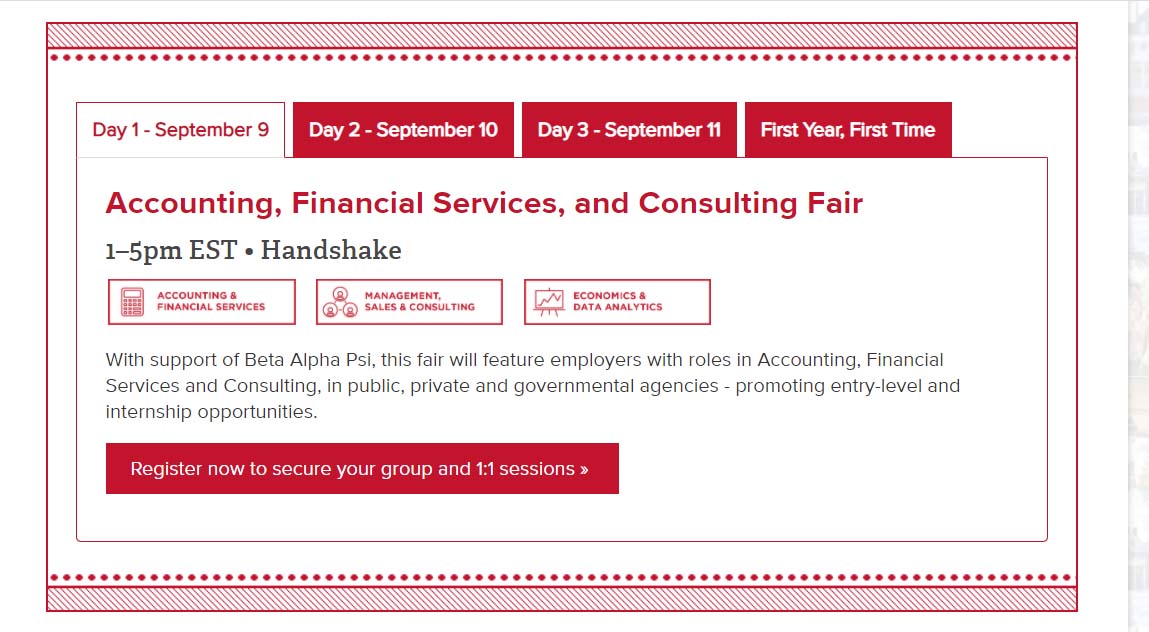Different look, same goal: FSB students visit Career Fair virtually


In a year when a pandemic swept the globe, the disruptions to normal life have been wide-ranging and varied. It’s been no exception for business students seeking an internship or their first job after graduation. Thanks to some creativity and hard work by the Center for Career Exploration & Success and the Farmer School Career Services team, students were able to “meet” with more than 200 employers who were actively seeking to hire students for internships and full-time positions via a virtual Fall Career Fair.
It was also an adjustment for FSB students who helped transform the traditional in-person event into something very different. “It was very tough. Working with the Career Services team, we were really concerned about some of the technology factors that are nonexistent when you go to the regular career fair. What if my audio is not working? What if my video is not working? You don't have to worry about recruiters not being able to see or hear you when you go to Millett Hall,” senior accountancy major Frannie Hillyer explained.
In the days before the fair, Hillyer and senior accountancy/analytics major Morgan Pohl put together a pair of videos for students to give them some idea of how the fair would work. “Students would register for the event, and then when participating employers created a schedule, students would pick the companies and time slots that worked for them,” Pohl said. “So it was like a one-on-one virtual Zoom room. There were also group meeting options as well.”
More than 230 employers took part in the fair, which lasted for four hours on each of three days, and each day emphasized different companies and majors.
Senior finance and ISA major Michael Klass had specific plans for his career fair experience. “There were two or three companies that I wanted to check out at Career Fair. These were companies that I have long-standing relationships with, so I was pretty much just going to touch base, network a little bit, ask any ancillary questions that I had, use it as another touch point in the recruiting process,” he remarked.
“I think they did a great job adjusting to the current situation. It really was a good opportunity for a lot of students to be able to still make those connections with the recruiters,” Klass said. “If you think about it, you had a 10-minute meeting period. Over four hours in three days, that’s 12 hours of Virtual Career Fair, with potentially six sessions an hour. That puts you at up to 72 different companies you could potentially reach out to if you wanted.”
For her part, Abercrombie & Fitch recruiter Rachel Dietz, a 2018 FSB graduate, thought the Virtual Career Fair went quite well. “It went very smoothly from our perspective! We were still able to connect with high-caliber Miami students, without them having to sit in our 30+ minute line,” she said. “When we occasionally ran into some technical difficulties, students remained calm and were very flexible. We were able to make some authentic connections with students.”
"Going into a virtual career fair experience, you anticipate that there will be a number of challenges and technical difficulties. However, I was pleasantly surprised by how seamless the technology and overall experience ran. While I would have loved more than 10 minutes to get to know each student, I still felt engaged and was able to connect well with candidates," Deloitte Consulting's (and 2018 FSB marketing grad) Marilyn Zubak said. "While nothing can replace the value of in-person interactions, I was overall satisfied with the set-up and effectiveness of the virtual career fair."
The process did require some adjustment for the students taking part. “I think it definitely was a different experience. When I did trainings, I told the students that this would be a mix of the traditional interview that they're used to and also kind of a casual interview,” Pohl said. “I think the biggest thing was making sure that they were very engaged and coming off in a personal way through the computer.”
“Students need to continue to be warm and engaging, even more so on a virtual platform,” Dietz said. “It can feel more difficult to get to know a student virtually than in person, so it’s important for students to be attentive and engaged throughout the virtual session.”
“I think they had to display some different skills, because normally you're waiting in a line and then you can hand them your resume, give them your elevator pitch, ask a couple of questions, but there's kind of like a time pressure that you feel like, ‘OK, they've got this big, long line, so I need to get in and get out,” Hillyer remarked. “But I think with the individual time slots, it was more conversational and students got the chance to be more personable and probably showcase their personality a little bit better.”
And there were other advantages to the virtual format. “I was only in a suit for about 40 minutes, talked to four recruiters, and I was in and out and done. Traditionally I would be there for at least the full four hours,” Klass noted. “It reflects the current times. I think everything's a little bit less personal but maybe a little more convenient. It’s a matter of balancing that trade off, and ultimately I think the Farmer School and Miami did a really good job with it.”

